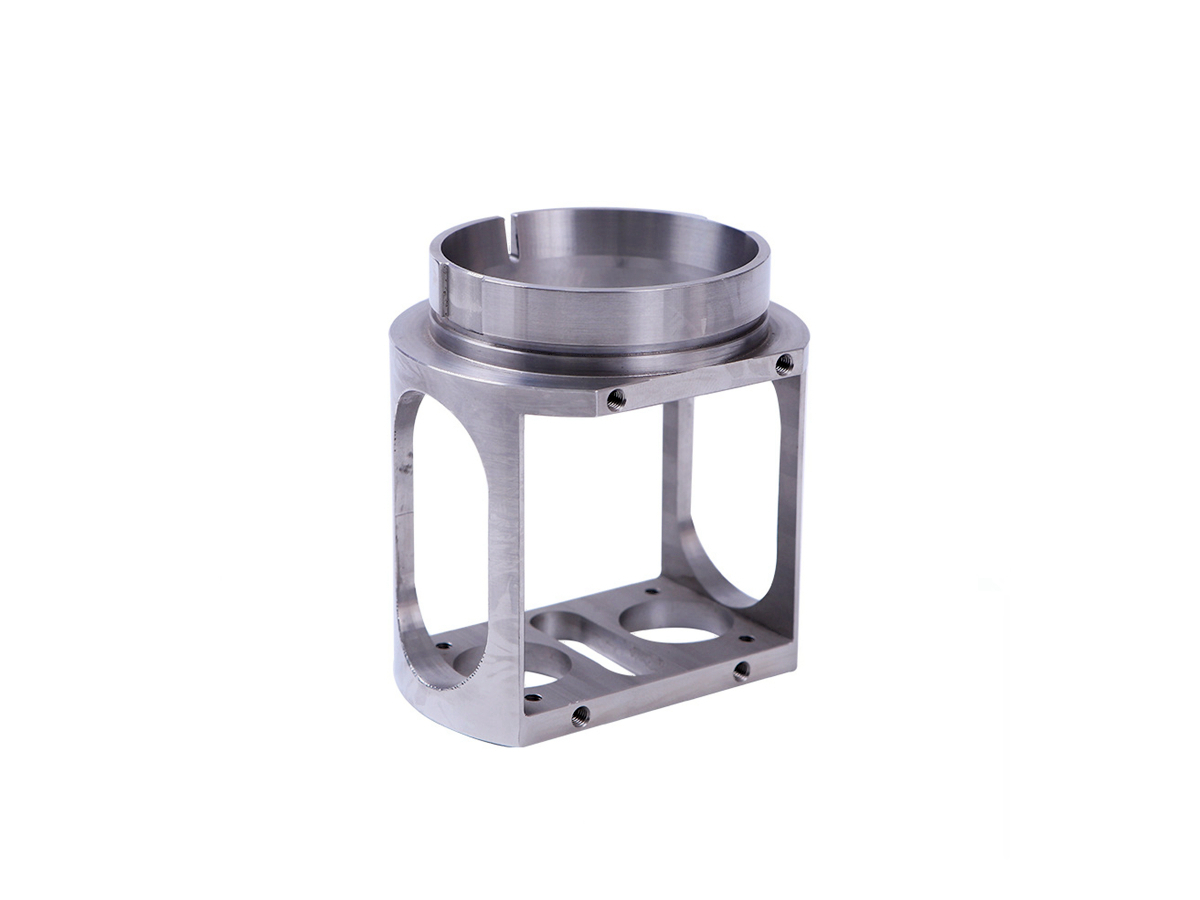High-Precision Low-Volume CNC Machining of Stainless Steel 430 for Affordable Manufacturing
Introduction to High-Precision CNC Machined Stainless Steel SUS430 in Cost-Effective Manufacturing
Industries such as consumer products, appliances, and automotive sectors frequently require materials that combine affordability, corrosion resistance, and reliable mechanical properties. Stainless steel SUS430, a ferritic stainless steel with excellent corrosion resistance, good formability, and cost efficiency, is an ideal candidate for high-precision, low-volume CNC machining. It's widely used to manufacture components such as appliance panels, decorative trim, automotive fittings, and economical hardware.
By leveraging advanced CNC machining, manufacturers produce SUS430 stainless steel parts with precise geometries, high dimensional accuracy, and outstanding surface finishes, delivering quality components cost-effectively, even at low volumes.
Comprehensive Analysis of SUS430 Stainless Steel for Affordable Precision Components
Comparative Performance of SUS430 Stainless Steel and Similar Materials
Material | Tensile Strength (MPa) | Yield Strength (MPa) | Machinability | Typical Applications | Advantage |
|---|---|---|---|---|---|
450-600 | 205-450 | Good | Appliance parts, automotive trim | Affordable, excellent corrosion resistance | |
515-720 | 205-515 | Good | Kitchen equipment, general fittings | Good strength, corrosion resistance | |
480-690 | 290-450 | Good | Hardware components, basic tools | Moderate strength, good machinability | |
515-620 | 205-310 | Moderate | Marine hardware, chemical fittings | Superior corrosion resistance |
Strategic Material Selection for CNC Machined SUS430 Stainless Steel Components
Choosing SUS430 stainless steel for precision CNC machining involves considering affordability, corrosion resistance, and mechanical stability:
Appliance panels, automotive trims, and decorative fittings benefit significantly from SUS430 due to its affordability, attractive appearance, and reliable corrosion resistance in mildly corrosive environments.
For applications requiring higher strength and improved corrosion resistance, SUS304 is often selected, particularly in kitchen and food-related equipment.
General hardware and basic tools needing moderate strength and good machinability are suitable for SUS410.
Components used in aggressive environments demanding superior corrosion resistance, such as marine hardware or chemical equipment, commonly utilize SUS316 stainless steel.
Precision CNC Machining Processes for SUS430 Stainless Steel Components
CNC Machining Process Performance Overview
CNC Machining Process | Dimensional Accuracy (mm) | Surface Roughness (Ra μm) | Typical Applications | Key Advantages |
|---|---|---|---|---|
±0.005-0.01 | 0.4-1.6 | Automotive fittings, cylindrical parts | Accurate rotational machining | |
±0.005-0.02 | 0.4-3.2 | Appliance components, custom brackets | Versatile and detailed production | |
±0.01-0.02 | 1.6-3.2 | Precision holes, mounting brackets | Accurate hole positioning | |
±0.003-0.01 | 0.2-0.6 | Complex consumer products, decorative parts | Exceptional precision, complex detailing |
Optimizing CNC Machining Processes for SUS430 Stainless Steel Components
Selecting the appropriate CNC machining process for SUS430 stainless steel components involves evaluating complexity, required precision, and surface finish needs:
Cylindrical automotive components and decorative trims requiring precise tolerances (±0.005 mm) and excellent surface quality (Ra ≤1.6 µm) achieve optimal results with CNC Turning Service.
Appliance components, custom fittings, and hardware with intricate features demanding dimensional accuracy within ±0.005 mm are ideally suited to CNC Milling Service.
Components requiring accurately aligned and consistently sized holes (±0.01 mm tolerance), such as mounting brackets and fittings, are efficiently produced using CNC Drilling Service.
Complex decorative trims or automotive interior fittings requiring ultra-precise dimensions (±0.003 mm) and superior finishes (Ra ≤0.6 µm) significantly benefit from Multi-Axis CNC Machining Service.
Advanced Surface Treatments to Optimize SUS430 Stainless Steel Components
Surface Treatment Performance and Suitability
Treatment Method | Corrosion Resistance | Wear Resistance | Industrial Suitability | Typical Applications | Key Features |
|---|---|---|---|---|---|
Excellent (>1000 hrs ASTM B117) | Moderate | Excellent | Appliance panels, automotive trims | Improved corrosion resistance, surface purity | |
Outstanding (>1500 hrs ASTM B117) | Moderate | Excellent | Decorative fittings, appliance surfaces | Enhanced appearance, corrosion resistance | |
Excellent (>1500 hrs ASTM B117) | High | Excellent | Appliance frames, automotive parts | Durable and aesthetic finish | |
Good | Moderate | Good | Decorative components, brackets | Uniform matte appearance |
Strategic Surface Treatment Selection for CNC Machined SUS430 Stainless Steel
Optimal surface treatment selection involves balancing corrosion resistance, aesthetic appearance, and wear resistance:
Appliance panels, decorative trims, and automotive components requiring enhanced corrosion resistance commonly undergo Passivation.
Decorative and appliance components benefiting from superior visual quality, corrosion resistance, and smoothness use Electropolishing.
Automotive parts, appliance frames, and hardware that demand robust protection and aesthetic appeal benefit from Powder Coating.
Visible decorative brackets or fittings requiring uniform matte finishes utilize Sandblasting.
Typical Prototyping Methods for SUS430 Components
CNC Machining Prototyping: Ideal for precision prototyping of SUS430 components, offering excellent dimensional accuracy (±0.005 mm to ±0.01 mm), rapid turnaround, and realistic prototypes for functional testing.
Stainless Steel 3D Printing: Enables rapid prototyping of complex geometries without tooling. Ideal for validating designs, functional testing, and accelerating product development cycles.
Rigorous Quality Assurance for CNC Machined SUS430 Stainless Steel Parts
Detailed Quality Control Practices
Dimensional Inspection: Coordinate Measuring Machines (CMM) verify dimensional accuracy.
Surface Finish Testing: Profilometer measurements confirm surface roughness compliance.
Mechanical Property Testing: ASTM-compliant tensile, yield, and hardness tests.
Corrosion Resistance Testing: ASTM B117 salt spray testing ensures corrosion resistance.
Non-Destructive Testing (NDT): Ultrasonic, magnetic particle, and visual inspections for structural integrity.
Comprehensive Documentation: ISO 9001-compliant documentation provides traceability and adherence to quality standards.
Key Applications of CNC Machined SUS430 Stainless Steel Components
Appliance panels and decorative trims.
Automotive fittings and interior components.
Economical consumer hardware.
Precision brackets and mounting components.
Related FAQs:
Why choose SUS430 for affordable CNC machining?
Which CNC processes suit SUS430 best?
How do surface treatments improve SUS430 component performance?
What quality standards ensure SUS430 precision?
Which industries commonly use CNC machined SUS430 components?

